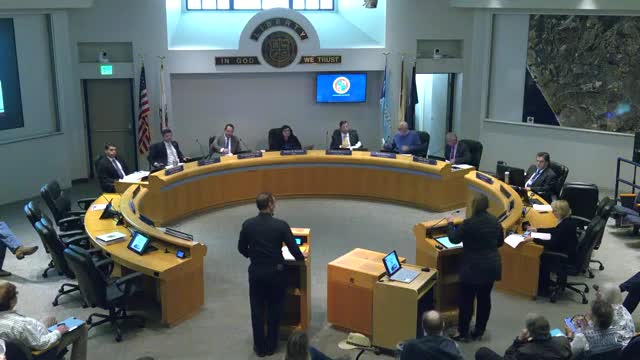Oceanside officials outline water and fire readiness, warn municipal systems have limits
Get AI-powered insights, summaries, and transcripts
Subscribe
Summary
City fire and water officials told the council that Oceanside maintains hydrants, reservoirs and mutual-aid agreements but municipal systems are not designed to fight the scale of recent Los Angeles urban conflagrations; officials urged personal preparedness and use of notification apps.
Oceanside officials gave a detailed briefing Jan. 22 on the city's water and fire preparedness, telling the City Council and residents what the public can reasonably expect from local systems and what lies beyond municipal capacity.
The lede: Fire Chief David Parsons and Water Utilities Director Lindsay Leahy said Oceanside maintains thousands of hydrants, 50 million gallons of reservoir capacity and regional mutual-aid arrangements, but warned that no municipal drinking-water system or local fire department is designed to extinguish the kind of fast-moving urban conflagrations seen recently in Los Angeles.
Why it matters: Council members and residents asked how the city would fare in a large wildfire or mass-evacuation scenario, a concern heightened by recent high-profile fires. Officials emphasized preparation, vegetation management and public-warning tools while noting limits on local authority and resources.
Key points from the staff presentation - Hydrants and supply: Leahy said the water utilities department maintains roughly 74,100 public hydrants and about 450 private hydrants. The city has 12 reservoirs able to store about 50 million gallons and draws from four sources, including two drinking-water treatment plants and interties that can receive treated water from the water authority if needed. - Hydrant maintenance: The utilities department performs routine inspections, lubrication and painting; staff photodocument maintenance and flag hydrants for replacement when needed. Private hydrants are the responsibility of property owners but are overseen by the fire department. - Capacity limits: Parson and Leahy both stressed that municipal water systems and local fire agencies are built to handle structure fires, limited vegetation fires and the typical incidents cities experience. Parsons said that events like the Palisades and Altadena fires would have required thousands more engines and resources than exist statewide; those incidents are described as urban conflagrations beyond local design assumptions. - Mutual aid and air resources: Oceanside participates in county mutual aid and unique North County automatic-aid agreements that send the closest appropriate resource regardless of jurisdiction. County, utility and state partners supply helicopters and, seasonally, large airtankers; officials warned availability is variable and wind can ground aircraft. - Private hydrants and standards: Parsons said private fire hydrants and private fire systems are subject to the city's plan-check and construction inspections and must be maintained to National Fire Protection Association (NFPA) standards. The city has a third-party database to track private-system inspections and maintenance. - Vegetation management and abatement: The city performs annual proactive vegetation management in spring and responds to complaints; the fire department is exploring part-time staff and contractor options for more proactive clearance. Parsons said forced abatement exists in code but would require funding and staff capacity to implement at scale. - Emergency notification and personal preparedness: Parsons urged residents to install emergency-notification apps (Genesis Protect and SD Emergency) and to register at alertsandiego.org for reverse 911. He said Genesis Protect maps evacuation orders and warnings; SD Emergency provides broader incident information.
Public comment and council questions - Michael Tenover (Oceanside Firewise organizer) thanked the departments and described local fuels-reduction and community work after the 2022 fires. - Resident Jimmy Knott, a former utilities commissioner, urged annual maintenance reporting and closer examination of hydrant placement in mobile-home communities and narrow neighborhoods with limited egress; concerns about access and traffic were raised repeatedly by council and residents. - Councilmember questions touched on helicopter refilling sites, the use of nearby water bodies for aerial attacks, the city's process for taking reservoirs temporarily offline for maintenance, and the status of vegetation abatement and forced-remediation authorities.
Nut graf: City staff emphasized that Oceanside has robust routine maintenance, mutual-aid relationships and community preparedness programs but that residents should not expect municipal systems to be sufficient for rare, large-scale urban conflagrations; officials urged residents to harden structures, register for alerts and participate in local preparedness programs.
Ending: Staff said they will post the presentation to the city website and continue outreach on vegetation management, hydrant maintenance and emergency-notification enrollment.
Speakers (attributed quotes may be used only from this list): Dave Parsons, Fire Chief; Lindsay Leahy, Water Utilities Director; Michael Tenover, community organizer; Jimmy Knott, resident and former utilities commissioner.
Authorities cited: National Fire Protection Association standards (NFPA) for inspection and maintenance of private hydrant systems.
Provenance: Presentation and Q&A recorded in council meeting transcript, item 14.
